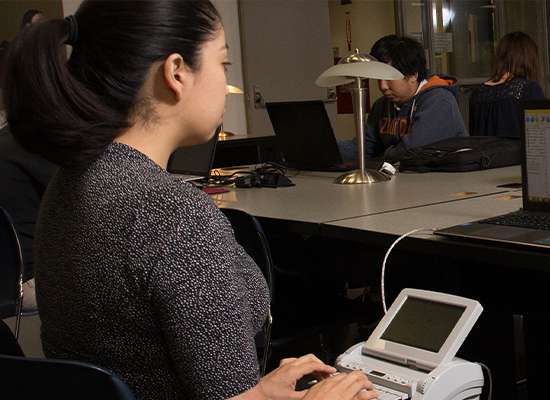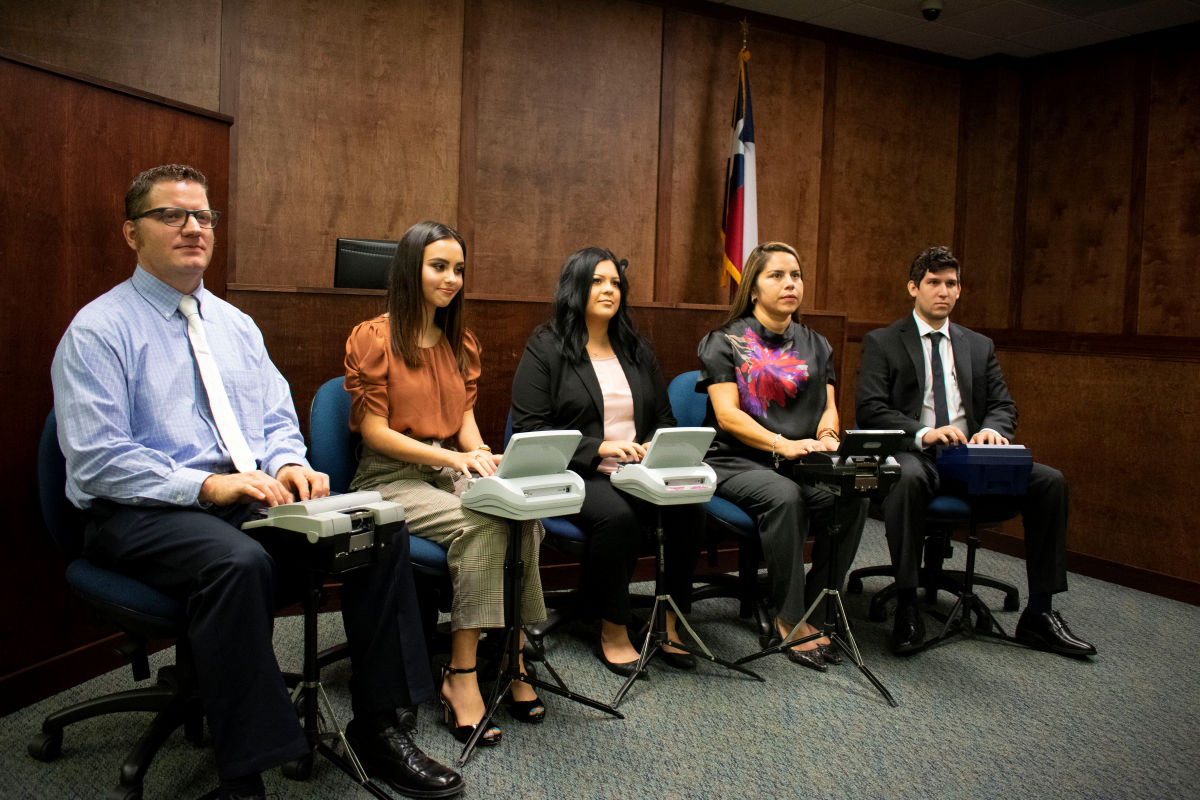How durham court reporting technology are reshaping the legal process
Everything About Court Reporting: Important Insights Into Its Value in Law
Court reporting serves an essential feature within the lawful framework, offering a accurate and dependable record of proceedings. With sophisticated techniques and tools, court press reporters record the nuances of testaments and lawful discussion. The relevance of their work prolongs beyond plain transcription. As the legal landscape advances, so also does the duty of technology in court reporting. Recognizing these characteristics reveals deeper effects for justice and transparency in the lawful system.
The Duty of Court Reporters in the Legal System

Although often overlooked, stenotype reporter play an essential duty in the legal system by guaranteeing a verbatim and exact record of process. Their key duty involves recording talked words during tests, depositions, and other lawful events, which functions as an official record for future recommendation. This documentation is very important for allures, as it offers the necessary details for examining choices made by courts and courts.
Stenotype reporter have to possess extraordinary listening abilities and a deep understanding of lawful terminology to record the nuances of testament and argumentation precisely. Their job contributes to openness within the judicial process, enabling responsibility and fairness. Additionally, they help with accessibility to justice by making records offered to involved events, guaranteeing that every person has the opportunity to evaluate the procedures. This way, stenotype reporter support the integrity of the legal system, reinforcing the importance of exact communication in issues of regulation.
Strategies and Tools Made use of in Court Reporting
In court reporting, different methods and tools improve the precision and performance of transcription. Stenography innovation plays a considerable role, enabling reporters to capture spoken words quickly, while digital recording techniques supply different remedies for paperwork. Understanding these tools is important for realizing just how stenotype reporter accomplish their important feature in the legal system.
Stenography Technology Introduction
Stenography modern technology functions as the cornerstone of modern court reporting, enabling reliable and precise transcription of talked discussion. Making use of specialized equipments called stenographs, stenotype reporter can catch speech at amazing speeds, commonly surpassing 200 words per minute. These equipments use a special keyboard layout that allows numerous tricks to be pushed concurrently, developing phonetic depictions of words - durham court reporting. This method decreases the demand for substantial punctuation and improves transcription accuracy. In addition, clerks use various shorthand techniques and icons to additional streamline the procedure, guaranteeing that no information is forgotten throughout proceedings. The integration of stenography modern technology not just fosters reliable communication in lawful setups yet also supports the stability of the judicial procedure by providing reliable and precise documents of discussions
Digital Recording Approaches
An enhancing variety of court reporting experts are transforming to digital recording approaches to improve the precision and efficiency of their transcriptions. These strategies utilize sophisticated audio and video clip technology to capture procedures in real-time. Digital recorders, frequently combined with top quality microphones, ensure that every word talked is maintained with clearness. Specialized software application can transcribe audio documents instantly, allowing for quicker turn-around times. Some professionals include twin recording systems for redundancy, ensuring no critical information is lost. Furthermore, electronic recordings can be quickly indexed and looked, facilitating quick retrieval of particular sectors. As lawful atmospheres develop, embracing these digital tools not only streamlines the reporting process however also maintains the stability of the document.
The Value of Accuracy in Transcription
Precision in transcription is essential in court reporting, as it assures that lawful records show the true content of procedures. This accuracy can considerably affect instance outcomes, influencing the choices made by courts and courts. Keeping high criteria of accuracy is critical in the legal career.

Accuracy in Legal Records
The lawful system counts greatly on significant debates and convincing rhetoric, the true foundation of judicial procedures exists in the precision of lawful records. Accurate transcription is important, as it assures that every ruling, declaration, and concern is documented properly. Such accuracy serves multiple objectives, including giving a reliable reference for allure processes and maintaining the stability of the judicial system. Mistakes in transcription can result in misconceptions, misconceptions, and potentially damaging effects for all celebrations included. Court reporters have to have extraordinary skills and focus to information, as their job straight impacts the quality of legal documents. Eventually, the precision of legal documents underpins the depend on positioned in the judicial process, enhancing the importance of thorough transcription.

Effect on Instance Outcomes
When lawful proceedings unravel, the precision of transcription often determines the trajectory of a situation's end result. Precise court reporting guarantees that every word spoken is successfully recorded, making it possible for judges, attorneys, and juries to make educated choices based upon the record. Errors in transcription can bring about misunderstandings, misinterpretations, and possibly unjust judgments. The stability of legal papers counts heavily on the precision of these documents, as they act as the structure for appeals and more lawsuits. In high-stakes instances, where the effects are extensive, the duty of a court reporter comes to be also a lot more vital. Maintaining extensive standards in transcription not just supports the lawful procedure but likewise supports the principles of justice and justness in the court room.
Court Reporting in Different Legal Setups
Court reporting plays an important role across numerous lawful settings, making certain that procedures are properly documented for future referral. In criminal court, court reporters transcribe testaments, proof, and judicial rulings, which are important for allures and situation testimonials. In civil lawsuits, accurate records facilitate the discovery process and supply a reputable document for test process. Administrative hearings often depend on court reporters to preserve a main record, making certain transparency and responsibility in governmental procedures. Family members courts also take advantage of court reporting, as exact documents of process can influence protection decisions and negotiations. Furthermore, depositions in pre-trial phases need precise recordings to record the nuances of witness testimonies, which may be considerable fit instance approaches. In general, court reporting offers as a foundation in the legal system, promoting justness and quality across diverse judicial environments.
The Influence of Modern Technology on Court Reporting
As technology remains to progress, its impact on court reporting has actually ended up being significantly substantial. Developments such as electronic recording, real-time transcription software, and expert system have transformed standard techniques. Digital audio recorders now catch courtroom procedures with amazing quality, allowing court reporters to concentrate on nuances and context as opposed to solely on inputting. Real-time transcription modern technologies enable instant access to records, advertising effectiveness and improving collaboration amongst legal professionals. In addition, expert system tools are being integrated to assist in the transcription procedure, reducing human mistake and accelerating document generation. In spite of these improvements, the important abilities of stenotype reporter continue to read what he said be important, as they offer a nuanced understanding of lawful language and courtroom characteristics. Eventually, technology enhances as opposed to replaces the experience of court reporters, ensuring that the stability and precision of lawful paperwork are supported in a significantly electronic landscape.
Profession Opportunities and Pathways in Court Reporting
The advancement of innovation in court reporting has actually opened a variety of job chances for aspiring experts in the area. Commonly, court press reporters were largely liable for recording lawful procedures. Nonetheless, developments such as electronic recording and real-time reporting have increased their roles.
Today, court reporters can specialize in areas such as captioning for television broadcasts, offering transcription solutions for legal firms, and operating in the company sector for conferences or depositions - durham court reporting. Additionally, chances in remote reporting, particularly due to the increase of online courts, have actually come to be significantly common
Educational pathways include official training programs, certification courses, and proceeding education and learning to remain upgraded with technological changes. Networking within Recommended Site professional and legal companies additionally plays a significant role in job improvement. Overall, the varied opportunities in court reporting show the dynamic nature of the legal profession and the raising demand for experienced specialists.
The Future of Court Reporting in an Evolving Legal Landscape
How will the duty of court reporting adapt as the lawful landscape remains to develop? As technology breakthroughs, court reporting is most likely to embrace ingenious devices such as expert system and real-time transcription software. These improvements may boost accuracy and efficiency in recording legal procedures. The enhancing frequency of remote hearings requires that court reporters end up being proficient see this website in digital systems, ensuring smooth paperwork regardless of area.
At the same time, court reporters will certainly need to adjust their abilities to manage brand-new kinds of instances, such as those involving cyber legislation and intellectual residential property conflicts, which call for specialized understanding. In addition, the need for instant accessibility to transcripts will press specialists to deliver quicker turnaround times without compromising top quality. Ultimately, the future of court reporting will hinge on a balance between conventional skills and technological integration, guaranteeing that the integrity of the lawful procedure continues to be intact in an increasingly digital world.
Often Asked Questions
Just How Do Court Reporters Take Care Of Delicate Info Throughout Procedures?

What Qualifications Are Needed to Come To Be a Stenotype Reporter?
To end up being a stenotype reporter, people usually require a secondary school diploma, specialized training from an approved program, efficiency in shorthand or voice writing, and qualification or licensure, relying on state needs and laws.
Are Court Reporters Required to Have a Permit?
Stenotype reporter are typically called for to get a permit, depending upon the territory. Licensing guarantees that they fulfill details standards of effectiveness and professionalism and trust, which is essential for maintaining the honesty of lawful process.
Exactly How Do Stenotype Reporter Manage Different Accents and Dialects?
Stenotype reporter take care of different accents and languages via extensive training, technique, and experience with various speech patterns. They commonly make use of specialized software and techniques to accurately catch talked words, making certain clarity and precision in their records.
What Is the Average Income for a Court Reporter?
The average income for a court press reporter differs by location and experience, normally ranging from $50,000 to $80,000 every year. In high-demand locations, incomes can surpass $100,000, mirroring the career's significance and specialized skills.
Typically forgotten, court reporters play an important function in the lawful system by making sure a exact and verbatim record of process. In criminal court, court reporters transcribe testimonies, evidence, and judicial judgments, which are vital for allures and instance testimonials. Family courts likewise benefit from court reporting, as accurate paperwork of procedures can influence wardship decisions and settlements. Traditionally, court reporters were largely accountable for transcribing lawful process. Today, court reporters can specialize in locations such as captioning for television broadcasts, giving transcription services for lawful companies, and functioning in the corporate market for conferences or depositions.